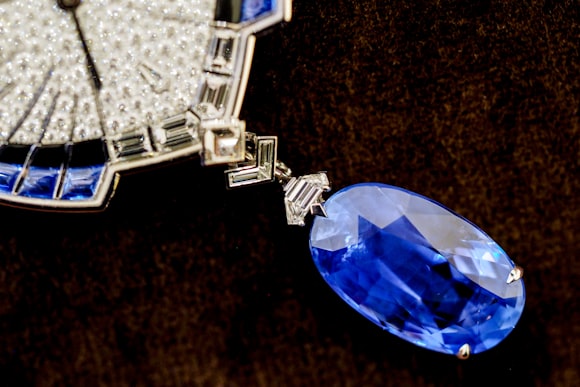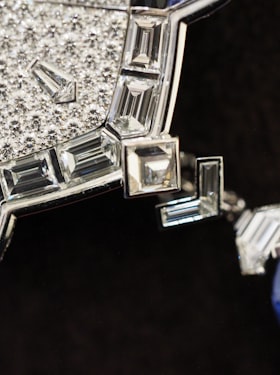"When the commissionaire had gone, Holmes took up the stone and held it against the light. It’s a bonny thing,' said he. 'Just see how it glints and sparkles. Of course it is a nucleus and focus of crime. Every good stone is. They are the devil’s pet baits. In the larger and older jewels every facet may stand for a bloody deed. This stone is not yet twenty years old. It was found in the banks of the Amoy River in southern China and is remarkable in having every characteristic of the carbuncle, save that it is blue in shade instead of ruby red. In spite of its youth, it has already a sinister history.'" – Sherlock Holmes: The Adventure Of The Blue Carbuncle

This might seem a rather ominous way to start off a look at one of the most spectacular objects we saw at the Salon this year: the Cartier Tourbillon Mystérieux Azuré, a gem-set pendant tourbillon watch, and a unique piece. But I mention it as a way of underscoring the irrational passion that gemstones can arouse. Now, this is an horologically interesting creation – the movement, Cartier caliber 9463 MC, is a double mystery tourbillon, like the Rotonde de Cartier Double Mystery Tourbillon wristwatch – and to say that the mechanism is incidental to the appeal of the Tourbillon Mystérieux Azuré would be doing its ingenuity an injustice.

But while not incidental, mechanics in this case is definitely here not to take center stage, but to lend itself to the larger, overall aesthetic effect of the timepiece. Think of it as a wearable mystery clock.

The appeal of precious gems is one of the best examples I can think of, of really purely irrational desire. Diamonds are of course just the tip of the iceberg in this respect; colored stones especially seem to arouse the beast in people (as Holmes remarks in The Adventure Of The Blue Carbuncle, "carbuncle" being an old English term for any colored stone – generally red). The most famous blue precious gem by far, and an exemplar of just how much aura these stones can have, is the famous, and notorious, Hope Diamond, around which legends have sprouted like mushrooms after a thunderstorm. The Hope Diamond is said to have originally adorned the eye of an idol, and naturally, is also said to carry a curse.

Certainly, the fates of many of its owners are both lurid and varied; as reported by the New York Times in 1911, they include King Louis XVI (who owned the stone from which the Hope was cut: the French Blue) and others, who were, "torn to pieces by a mob," "thrown from a precipice," "murdered by her sweetheart," and, perhaps most colorfully, "torn to pieces by wild dogs in Constantinople," (although "died in misery and want" – the fate of one Francis Deaulieu – has a fine, morbid, Late Victorian ring to it).
However, no such aura surrounds the Cartier Tourbillon Mystérieux Azuré – though it does have, as the gemological mate to the horological fantasia that is the double mystery tourbillon, a quite magnificent blue stone as its centerpiece. The gem is a sapphire, nearly 26 carats in weight, which forms the detachable pendant to the main, diamond encrusted body of the timepiece.


The latter is in the form of a stylized butterfly. The sapphire was mined in Ceylon – long a source for sapphires; Ceylonese sapphires can vary considerably in depth of color, though the most desirable are a saturated cornflower blue.
It's always interesting, too, to reflect on the very pedestrian nature of the basic ingredients of something so valuable. Diamonds, after all, are nothing but "crystallized charcoal," as Holmes remarks later in The Adventure Of The Blue Carbuncle. (Diamonds, being carbon, will also burn, as it turns out, although the ignition temperature is high enough that demonstrations usually use an external oxygen source.) Sapphires aren't carbon, but they are another pretty ordinary material: corundum, an aluminum oxide, which is generally used as an industrial abrasive. It's also very hard, of course, which is why synthetic sapphire's so popular for watch crystals (and sometimes cases as well).


The case and chain of the Cartier Tourbillon Mystérieux Azuré are in rhodiumized white gold.
White diamonds, white metal (either white gold or platinum) and blue sapphire are all both symbolic of Cartier, and a part of its heritage of design. Lots of folks like to object to the blue cabochon on the crown of modern Cartier watches but asking Cartier to abandon the cabochon would be like asking Rolex to abandon the crown (and the fact that Cartier retains it in its modern watches is something I admire about them – exactly the sort of tangible connection to a company's history one wants).

At € 1.2 million, it's already sold, and whomever wears it is going to have one of the most irrationally desirable timepieces of the year. It was quite literally the last thing we saw at the Salon, and just as well; anything else would have been anticlimactic.
High Jewelry Tourbillon Mystérieux Azuré watch, manufacture mechanical movement with manual winding and mysterious double tourbillon, caliber 9463 MC. Case and chain in rhodiumized 18K white gold set with a faceted oval-shaped Ceylon sapphire of 25.93 carats, with 1,017 brilliant-cut diamonds totaling 15.92 carats, with 31 rose-cut diamonds totaling 1.00 carat, with 18 baguette-cut diamonds totaling 2.45 carats, with 14 sapphires totaling 2.27 carats, with a princess-cut diamond for .32 carats, and with onyx, with a sapphire crystal and case-back, rhodiumized steel sword-shaped hands. Water-resistant to 3 bar (approximately 30 meters/100 feet). Unique piece. Price, € 1,200,000. Sold, but still visible in all its unobtainable glory at Cartier online.
Follow HODINKEE's live SIHH 2016 updates here, and in our mobile app, and you can read all SIHH stories here.
No comments:
Post a Comment